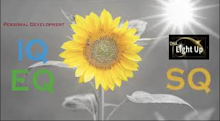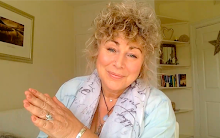One of my particular areas of interest, as those who have experienced any kind of coaching with me will already know, is the use we make of language. How the words we habitually use to describe ourselves, or our situation, can provide the keys to what is really happening for us. Many of my clients, for example, will come to me looking for solutions to a situation they describe as something they "should" do, or "need" to change, or "have to" do something about. The fact that these restrictive, or punishing words are being used, tells me instantly that there is an internal conflict going on for that person. It's like there's a part of them that's quite literally scolding another part of them - although we're rarely actually taught about the impact of such language on ourselves and on others. When I'm working with someone, or a team, their language can quickly tell me where there's a gap - a void. How, unconsciously, they're continuing to repeat the very pattern that is bringing them the results they say they don't want.
So I'll invite them to find other words to describe the same situation, and at the same time bring a sense of connection and power - so that they can stop the battle about what they "should" or "must" be doing, and instead move through that to find the key that can actually create the changes that have been so difficult to resolve. Because once that internal battle is dissolved, then they are free to work on whatreally counts. Until that is done, they'll continue going round in circles - and as a result will experience frustration and self beat up because they can't make any progress. It's not rocket science - it's actually very simple. And the simplicity is what, sometimes, means it's difficult for people to believe.... until they actually experience the changes when they choose a different description to explain the same situation. The situation itself doesn't change, but the way they feel about it changes completely. And this is what I mean about perspectives.
Another example - and one of my particular bugbears - is the way in which numerous positive thinking books, and motivational teachers, will encourage us to focus on what it is we want from life."Get absolutely clear on what it is you want, and just how much you want to achieve it!" they'll enthuse "Make that vision real, so you believe what it is you want!" Now, all very well meaning, and I'm certainly not dismissing the good intention here. Far from it. What I'm questioning is, from my experiences, the continued inappropriate use of words. Because surely, if we state and re-state how much we want something, well then we're never going to have it - not now, not ever. Because all we're actually focusing on is the want... the lack.... the non-havingness that we're currently experiencing. It's like those well-meaning people who say with absolute certainty "I WILL do that thing" whatever it happens to be - go to the gym, stop smoking, find the right relationship. But no matter how much energy and passion we put in to the word will, that's exactly what it remains. WILL and not IS.... because no matter how fast we may choose to run towards that goal, each time we re-confirm that we WILL have it, well that's all we can experience. The sense that some time in the future we will do or have that thing we so desire.
So how do we fall so easily in to these traps? Why doesn't something stop us - or at least raise a warning flag to alert us that, perhaps, we've taken a wrong turn? Why do we continue blindly following the"shoulds" the "wills" and the "wants" - is it purely because we've been taught that this is the correct way to achieve our goals? Or is it something else? This, for me, is the crux of the matter.
I believe that, too many times, we are taught to assess the world purely through our cognitive, thinking ability rather than through our senses. The feelings, the instincts, the soul if you like, that exists within each and every one of us. Our thoughts, it is said, create our reality. And I absolutely believe that to be true. The thing is, though, if we don't check our thoughts through our internal feeling process, then how will we know whether the thoughts we are choosing are actually achieving what it is we say we'd like to have more of or less of in our lives? How on earth can we know whether, even with all the right intentions, we're inadvertently heading down the wrong track?
I remember attending an Anthony Robbins 3-day seminar some years ago. It was an amazing experience, and one I would recommend wholeheartedly. But there was an incident on the second day when I just couldn't help chuckling to myself. He was encouraging the audience of thousands to take control of their life. To feel good about themselves. To BE who they choose to BE - and not settle for anything less. And he had everyone following a chant to remind them - The Winners Creed. This, more or less, was how it went. Mr Robbins would lead with a phrase, and the entire audience would follow it with passion. So imagine, if you will, the pumping music, the hyped up audience, and the highly effective speaker leading the chant:
"Now I am the voice!" (now I am the voice!)
"I will LEAD not follow!" (I will LEAD not follow!)
... and instantly my impish giggle started, and wouldn't stop. Here were all these people following along to exactly what was being fed to them! Now, I'm not saying that this was done on purpose, but I couldn't help but titter at the irony...!
We're taught to "go for it" to "reach out" to "seek and we shall find".... but instead of searching for something "out there" how often are we encouraged to go within ourselves instead? I was talking with a dear friend on Friday about this. He was telling me how he's got to make changes, how he's got do do certain things in order to achieve some major shifts in his life. I invited him to consider, then, what he was actually creating through those thoughts. I showed him how to go within himself and check in with his feelings - and the result was astonishing. Because it helped him to realise that all the time he thought he had to find something "out there" he was re-confirming the "fact" that his life right now was far from ideal. And all the time he's doing that... well... guess what... his life would remain exactly as it is. I reminded him of the countless stories about prisoners of war, who, regardless of their grim situations, continued to imagine themselves in a place of peace and beauty.
There's an account about one such prisoner who was a keen golfer. He used his time in solitary confinement to imagine he was on the fairway, practicing his golf swing. When he was finally released - yup, you guessed it - his ability on the golf course had increased ten-fold. The point here is, he wasn't imagining he would be on the golf course when he got out. He was imagining he was already on the golf course. He'd found the key that seems so elusive to so many of us - including those of us who avidly follow self-development and improvement teachings.
So my point is, the perspective we choose will always have a huge impact on the results we experience. As a perfect example, consider the picture above (Aude Oliver, Massachusetts Institute of Technology) which depicts two very different people. Close up, most people will see Albert Einstein. But move away from the screen, and Marilyn Monroe will take his place. Brains or beauty? Thoughts or Senses? We all have choices....
I, for one, believe that the most powerful choice remains in noticing the feelings that are inside us. In accepting those feelings, and nurturing the sense we would have if our lives were exactly as we would choose it to be. Because once we can achieve that, well then the rest follows. Yes, I believe our thoughts do create our reality - I have plenty proof of that from my own experiences. I also believe, from my own life experiences and from testimonials from my coaching clients, that the real trick is in acceptance of the good stuff rather than chasing things that we think are outside of us.
Have a go - it's easier than you may think!







